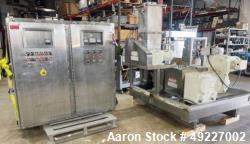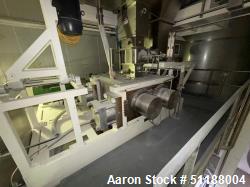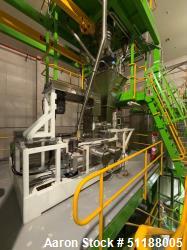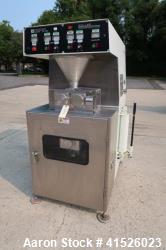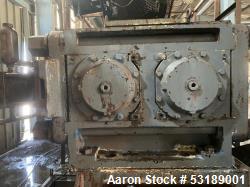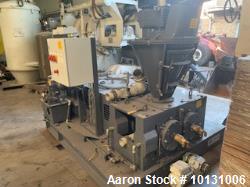Used Roll Compactors
Aaron Equipment has a large inventory of reconditioned, unused, and used roll compactors. Roll compactors are industrial machines used to compress and densify powder or granulated materials into a solid sheet or compacted mass without using a liquid binder. This process is called dry granulation and is commonly employed in industries like pharmaceuticals, chemicals, food processing, and agriculture. If you are looking to sell your roll compactor submit a request online or contact Erik Eichert at 630-238-7480.
Slowing Your Roll: Maximizing Efficiency with Industrial Roll Compactors
Industrial roll compactors play a vital role in material compaction across various industries. These machines enhance efficiency through dry granulation and precise powder densification. Proper particle size control is crucial for quality production. Understanding the workings of industrial rollers can streamline your processes significantly. This article will explore the benefits, applications, and future trends of industrial roll compactors. Let's delve into how these powerful machines can maximize efficiency in your operations.
What Are Industrial Roll Compactors?
Industrial roll compactors are robust machines used in material compaction. They work by pressing materials between counter-rotating rollers, transforming loose powders into solid sheets or flakes. This process, known as dry granulation, is essential in pharmaceuticals, chemicals, and food processing industries.
Key Components of Roll Compactors
Understanding the main components of roll compactors can help you appreciate their functionality:
- Rollers: These are the core components where compaction occurs. The material is fed between the rollers and compressed into a denser form.
- Feed System: This component ensures consistent delivery of material to the rollers.
- Control System: This system allows operators to adjust the pressure and speed of the rollers, which is crucial for achieving the desired level of compaction.
How Industrial Roll Compactors Work
Roll compactors work as follows:
- Feeding: Material is fed into the machine through a hopper.
- Compaction: The material passes through the rollers and is compressed into sheets or flakes.
- Granulation: The compacted material is then milled into granules of the desired size.
This continuous processing method ensures a uniform product with controlled particle size, which is critical for many applications.
Benefits of Using Roll Compactors
Industrial roll compactors offer several advantages:
- Efficiency in Material Handling: Roll compactors are designed for continuous processing, which means they can efficiently handle large volumes of material. Large-scale manufacturers find this to be useful.
- Enhanced Particle Size Control: The ability to adjust roller pressure and speed allows for precise control over the final product's particle size. This is crucial in industries where uniformity is essential, such as pharmaceuticals.
- Cost-effective and Environmentally Friendly: Roll compactors use dry granulation, eliminating the need for solvents and drying processes and reducing costs and environmental impact.
Applications of Industrial Roll Compactors
Roll compactors are used in a variety of industries, each with its specific requirements:
- Pharmaceutical Industry: In the pharmaceutical industry, roll compactors are used for powder densification and granulation of active pharmaceutical ingredients (APIs). This process ensures that tablets and capsules have consistent weight and potency.
- Chemical Industry: In chemical manufacturing, these machines help compact powders to improve flowability and reduce dust, thus enhancing safety and efficiency.
- Food Industry: In food processing, roll compactors create granules that improve the texture and solubility of food products.
Choosing the Right Compaction Equipment
When selecting an industrial roll compactor, consider the following factors:
- Material Characteristics: Different materials have different compaction requirements. Consider properties such as particle size, moisture content, and compressibility.
- Capacity and Throughput: Ensure the compactor can handle the volume of material you need to process.
- Customization and Control: Look for machines that offer adjustable settings for roller pressure and speed, which will allow for precise control over the compaction process.
Maintenance and Safety Tips
Proper maintenance of roll compactors is crucial for ensuring their longevity and performance:
- Regular Inspection: check for wear and tear on the rollers and other components.
- Lubrication: keep moving parts well-lubricated to reduce friction and wear.
- Safety Protocols: ensure operators are trained in the machine's operation and safety procedures to prevent accidents.
Future Trends in Roll Compaction
The field of material compaction is constantly evolving. Here are some trends to watch:
- Automation and Smart Technology: Roll compactors are becoming more automated, with advanced control systems that allow for real-time monitoring and adjustments.
- Sustainable Practices: Manufacturers are increasingly focusing on sustainability, leading to the development of more energy-efficient compaction equipment.
Well Regarded Manufacturers
While many reputable manufacturers exist, the market has shown a preference for the following Roll Compactor brands:
- BOMAG
- Caterpillar
- Dynapac
- Volvo CE
- Wirtgen (HAMM)
- Fitzmill
- Hosokawa
Industrial roll compactors are a vital component in manufacturing, offering efficient and precise material compaction. Whether you're in the pharmaceutical, chemical, or food industry, understanding how these machines work and how to choose the right one can significantly enhance your production process. By incorporating the latest technology and maintaining your equipment correctly, you can ensure that your roll compactors continue to deliver high-quality results, keeping your operations running smoothly and efficiently.
